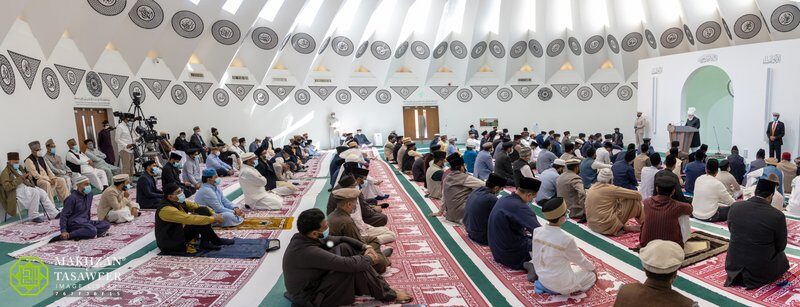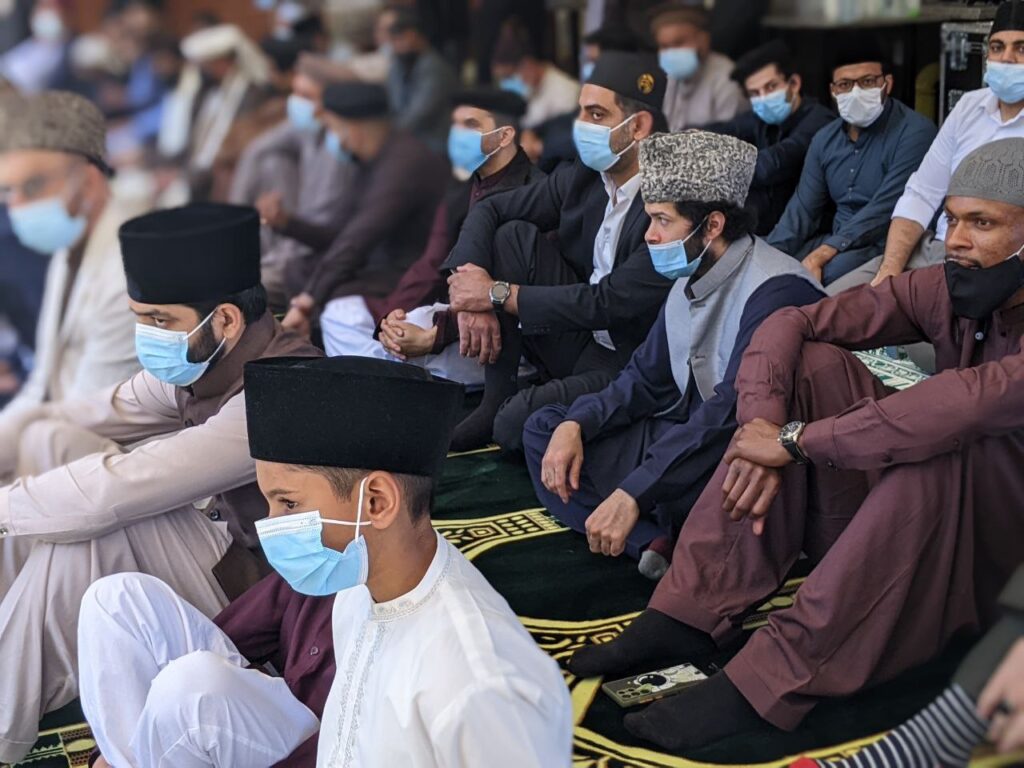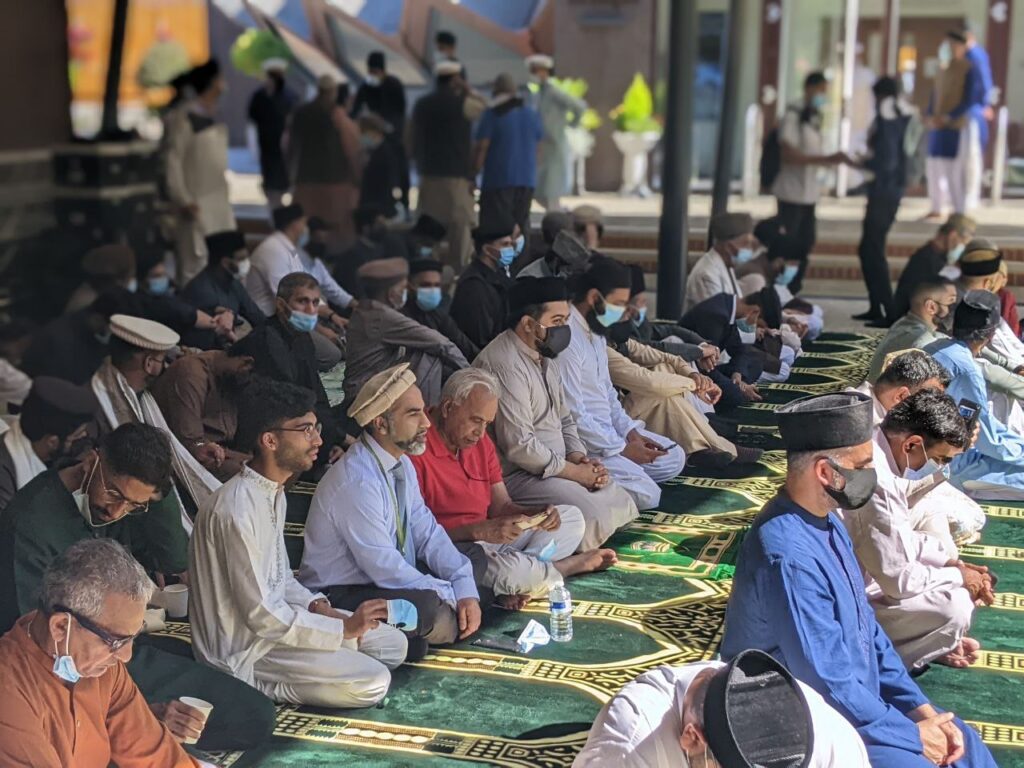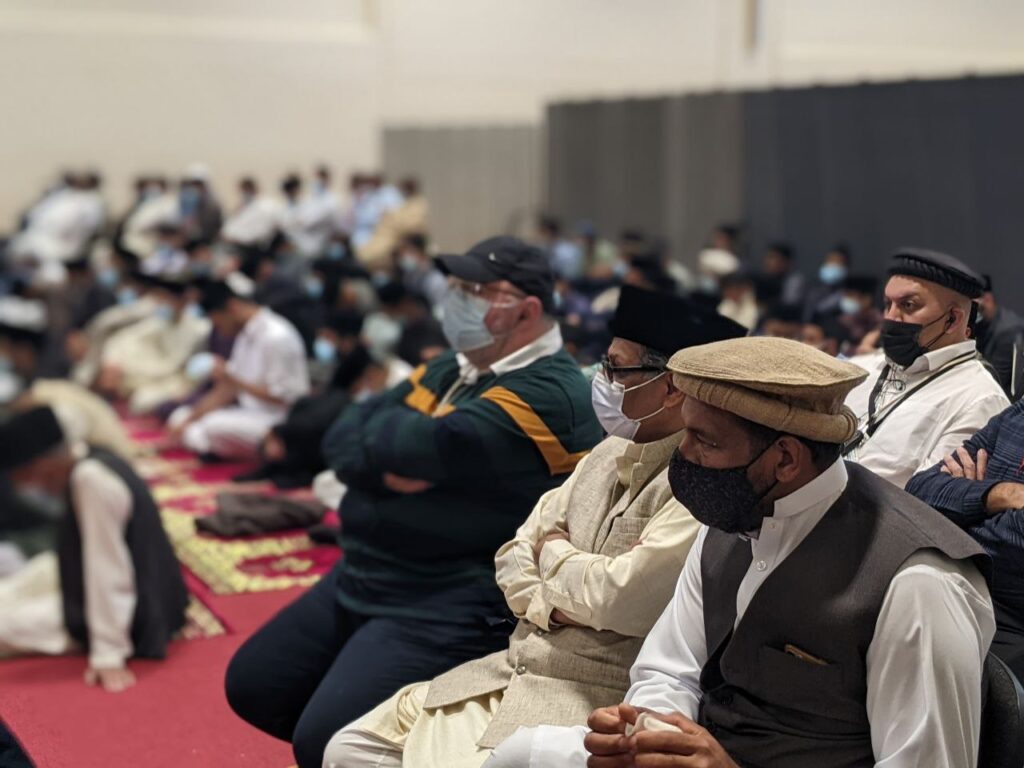
Islamabad, Tilford, 10 July 2022: Today, Hazrat Khalifatul Masih V, may Allah be his Helper, delivered his Eid-ul-Adha sermon.
After reciting the tashahud, ta‘awuz and Surah al-Fatihah, Hazrat Khalifatul Masihaa highlighted the importance of having trust in God’s promises, Who did not let sincere sacrifices go to waste and eventually granted victory to the believers. However, it was important to act according to God’s will.
Huzooraa said we were celebrating Eid-ul-Adha to commemorate the sacrifices of Hazrat Abrahamas, his wife and their son Hazrat Ishmaelas. This was not an isolated act of devotion; rather, their sacrifices spanned a long period throughout their lives. Allah, Who is Most True to His Word, rewarded them for these sincerely offered sacrifices most magnificently: The land which was once deserted now brims with millions upon millions of people in fulfilment of the promise that Allah the Almighty made.
Above all, the fulfilment of God’s promise found its culmination in the appearance of the Holy Prophet Muhammad, the Seal of the Prophetssa who was given the final Testament of God for the spiritual nourishment of all mankind.
It was for the propagation of this Holy Book, the Holy Quran to the corners of the earth through peaceful means and to establish the superiority of Islam that Allah also sent Hazrat Mirza Ghulam Ahmad of Qadian, the Promised Messiah and Mahdias who came in exact accordance with the prophecy of the Holy Prophet Muhammadsa, at his appointed time.
As a result of this sacrifice of Hazrat Abrahamas, Allah established a whole city and gathered all kinds of worldly delights and sustenance in Mecca and Medina. Huzooraa said that when pilgrims came to Hajj and worshipped God, they also took benefit of the surroundings and sustenance in the area. Now millions take benefit from this holy area.
This showed the fulfilment of Allah’s promise – he made a barren land full of blessings and sent the greatest Prophetsa to that blessed land.
Huzooraa said that the promise Allah gave to Hazrat Abarahamas and Hazrat Ishmaelas 4,000 years ago showed how Allah loved those who showed true sacrifice to Allah. There was no religion today, Huzooraa said, whose adherents followed the actual and original teachings of that religion. It was only the teachings of Islam that had been protected in the Holy Quran which remained today in its original form, despite the efforts of those who harboured hatred against Islam. Allah continued to send those who would protect the Quran both by word and meaning by sending people who truly followed it.
The Holy Prophetsa foretold that a man would come 1,400 years after him who would revive the lost teachings of Islam and would – through arguments and proofs – prove the truth of Islam and also tackle those who rejected God.
In following this prophecy, Allah sent the Promised Messiahas, Hazrat Mirza Ghulam Ahmad. It was this champion of Allah who showed the true light of Islam and claimed with powerful arguments that there was no religion greater than Islam. He challenged all religions to show their proofs if they thought they were greater than Islam.
The Promised Messsiahas announced to the Muslims that Islam would spread with love, not through war. He said, “If I had not come, someone else would have come.” He emphasised that it was the time for the Promised Messiah to come and exhorted Muslims not to go against him and instead, join his hand to spread the true teachings of Islam.

The Promised Messiahas told Muslims that they would see success if they joined hands with him and that they should be grateful for his advent. But instead, regrettably, the Muslims turned against this Messenger of Allah and continued to do so.
Huzooraa said that Muslims were not only at each other’s necks, but had issued edicts to murder, loot and harass the followers of Allah’s Messenger. They tried to stop Ahmadiyyat, but Allah creates new means of escape. Nevertheless, these opponents continue, in the name of Islam, to harass Ahmadi children in the streets and to even exhume the bodies of Ahmadis. But “What kind of Islam is this?”, Huzooraa asked.
Hazrat Abrahamas and Hazrat Ishmaelas prayed for a “peaceful” town so that those who abided there and visited might protect the establishment of peace. Therefore, if Muslims attributed themselves to the blessed town of the Ka‘bah, they should instil within themselves peace and create peace in society. To issue edicts of kufr against the followers of the Promised Messiahas and kill and harass them was not in keeping with the prayers of Hazrat Abrahamas for Mecca.
Huzooraa invited the Muslims – worldwide – to celebrate the true Eid by accepting the Promised Messsiahas.
Huzooraa said that in Pakistan, the authorities had announced that in the three days of Eid, no Ahmadi was allowed to offer sacrifice because they claimed it was against the sanctity of Islam if Ahmadis offered qurbani. This is to say that only the Muslim ulema had a right to qurbani and they had stamped Islam for themselves. However, if they do not desist in this way, then Allah’s decree would go into motion too and He would spare no one from among the enemies.
Huzooraa exhorted those Ahmadis who were suffering to be patient. He gave the example of the patience of Hazrat Abarahamas and his family. “Therefore, will that God Who is true to His promises leave us today? Surely not!”, Huzooraa told Ahmadis.
The enemies had not an ounce of power before Allah the Almighty; therefore, Ahmadis, more than before, should bow before Allah, better their levels of taqwa, develop the true spirit of Eid and sacrifice in the most accurate manner. It was then that we could partake of Allah’s blessings and the promises Allah gave to the Promised Messiahas.

Speaking about how to achieve this level of sacrifice, the Promised Messiahas said that humans had the instruction by Allah that they should, with all their power and being, be ready to sacrifice for Allah. The sacrifice of animals was just an example; the true sacrifice was fearing Allah to such an extent that you died in His path from his fear and as one offered sacrifices of animals with their hands, in the same way, died for Allah’s sake.
Huzooraa said that some hastily wrote to him that their prayers and sacrifices were not being fulfilled. The promises to the Promised Messiahas would certainly come true, Huzooraa said, but every one of us should ask ourselves if we are at the level of sacrifice which the Promised Messiahas spoke about.
One must show true sincerity for Allah and this required a spiritual death. The Promised Messiahas said that idol worship was not just worshipping stones; rather, everything which put a hurdle before Allah was an idol. Anything which stopped one from worshipping Allah or reaching Him is an idol.
Allah desired action and was pleased only by action, and action resulted from pain and grief, the Promised Messiahas said. This was what happened with the great sacrifice of Hazrat Abrahamas when he was ready to sacrifice his son, Ishmaelas, and then was also put into the fire. If one did this, then in turn, Allah would save them from pain and grief.
On this Eid, we should also introspect on our sacrifices, sincerity, truth and taqwa, Huzooraa said. As a Jamaat, the more we reflected on our conditions and sought to improve them, the quicker success came. We ought to pray for this as well, Huzooraa emphasised.
We should all pray that all Ahmadi men, women and children reach the level of sacrifice, practically, which Hazrat Abrahamas and his family achieved.
The Promised Messiahas said that Eid-ul-Adha was greater than the first Eid and people even said this aloud. However, how many are there who fulfil this Eid’s high standards? Many did not even reflect on why this Eid was called the “big Eid”.
Hazrat Amirul Momineenaa said many asked about a particular aspect of Eid-ul-Adha and that was how the tarbiyat of waqf-e-nau children should be carried out.
Huzooraa said:
“With reference to Eid-ul-Adha, I would also like to briefly address a question that is frequently asked in mulaqats – in virtual mulaqats as well as personal mulaqats – regarding the tarbiyat of waqifeen-e-nau and how to go about it. I have answered this in numerous places in my sermons and addresses. However, I wish to briefly speak and draw your attention to this.

“It is a huge grace and favour of God Almighty that upon the call of Hazrat Khalifatul Masih IVrh, parents replied with ‘Labbaik’ and dedicated girls and boys for this scheme – they are doing so currently and will continue to do so, insha-Allah. This example shall remain so long as an example of sincerity and loyalty remains within the Jamaat – so long as sincere members of the Jamaat look up to the example of:
وَاِبۡرٰہِیۡمَ الَّذِیۡ وَفّٰۤی
“[‘And Abraham who fulfilled (the commandments)’]; so long as the system of Khilafat is in the Jamaat – and this shall remain until the end of time – the practise of dedicating children for the sake of Allah shall also remain, insha-Allah.
“However, the parents who are dedicating, or have dedicated their children’s lives for the sake of serving faith, should remember that waqf demands a sacrifice. What is the standard of this sacrifice? It is the standard of sacrifice as displayed by Hazrat Abrahamas and Hazrat Ishmaelas. When Hazrat Abrahamas said to his son, ‘I saw myself slaughtering you in a dream’, and asked the son, ‘What is your intention?’ the son, whose tarbiyat was done by saintly parents who were infused with taqwa, replied, ‘Fulfil your dream. You will find me of the patient and those who offer sacrifice.’
“Thus, parents should have this in mind at the point of dedicating their children that ‘We are presenting our children, therefore their tarbiyat should be done in such a way, and we ought to pray for them, so that our children may answer in keeping with the tradition of Ishmaelas.’
“Parents should not merely sacrifice their children in a temporary state of passion or by imitating others; they should reflect and ask themselves, ‘Are we able to bring our children up in a way that reflects the response of Hazrat Ishmaelas?’ This can only happen when parents’ own example is such that can attain the highest standards of piety and taqwa. Otherwise, children grow up and respond by saying, ‘You dedicated us for waqf, but we are not ready for this. We cannot serve the Jamaat live off a small allowance. We cannot work with such and such limitations. Therefore, we cannot dedicate our lives.’
“Even if parents’ intentions are pure at the time of dedicating their children’s lives, if their practical and spiritual states are weak and they cannot positively play a role in their children’s tarbiyat, then the children can never be ready for such a sacrifice.
“Therefore, in this way, the parents of waqifeen-e-nau, or those parents who wish to dedicate the lives of their children, should reflect and ask themselves whether they can achieve such a standard.
“Similarly, if the children who have grown and are now fulfilling their waqf should be concerned about one thing, then it should be how they can excel in their standard of loyalty and sacrifice, and not how they can manage their household expenses. Have complete trust in Allah and excel in taqwa – Allah always fulfils one’s needs. The waqifeen-e-nau who are currently serving the Jamaat should look to adopt the attributes of Ishmaelas. Only then will Allah provide them with ways of prosperity and success.
“May Allah grant the parents the ability to perform their duty and may He grant Waqf-e-Nau children the ability to understand their duties related to waqf, to rely solely upon Allah and to offer sacrifices for the sake of faith. Having excelled in studies, may they not be those who turn to and indulge in the world; rather, may they be those who give precedence to their faith, fulfil their oath of waqf and sincerely offer their services. May Allah give them the ability to do so.”
In the end, Huzooraa led everyone in silent prayer, after which he conveyed “Eid mubarak” to all those present and all those watching live via MTA.
After silent prayer, Huzooraa left Mubarak Mosque and visited the marquee where women and children were present and conveyed his salaam and “Eid mubarak”.

